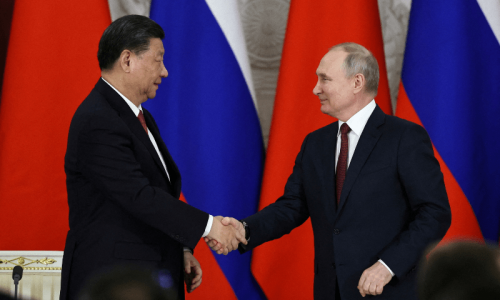WASHINGTON: Targeted sanctions against ruling generals could gradually ease the military junta’s grip on Myanmar and coax the regime into power-sharing talks with opposition leaders, analysts have said.
US lawmakers are mulling a range of options, including the possibility of ordering more sanctions, urging an arms embargo, sending a special envoy and trying to engage other major powers in a multi-party talks process.
The UN Security Council has issued its first joint statement slamming the military’s deadly crackdown on pro-democracy protesters in past weeks and calling for the release of political prisoners.
The regime triggered international outcry after 13 people were killed and more than 2,000 arrested during the demonstrations, which were led by Buddhist monks.
But according to an MP-elect from Myanmar’s self-proclaimed government in exile, Bo Hla-Tint, condemnation alone will not advance the opposition’s cause, or ameliorate conditions for the impoverished and marginalised population.
“The military is still applying brutal treatment to its own people. It is not enough to make strong statements. We need to follow with strong actions,” he said during a panel discussion at Johns Hopkins University.
The US-based member of the National Coalition Government of the Union of Burma is part of detained democracy icon Aung San Suu Kyi’s National League for Democracy party, which swept 1990 elections but whose results were ignored by the junta.
“Just directly imposing sanctions is not that effective. But threatening to impose them and explicitly mentioning ... that there will be certain consequences ... will change the mindset of the military leadership to come to the dialogue table,” he added.
The White House has warned that it could slap new sanctions on the military regime unless it halts atrocities against its own people, but it was not immediately clear what form those sanctions could take.
Earlier this month, Washington issued a travel ban against dozens of members of the ruling military junta and their family members, and also froze their assets abroad.
Bo Hla-Tint said they should be “targeted sanctions (that) will hurt military interests ... but not hurt the day-to-day existence of people in Burma”. US Senate Foreign Relations Committee aide Keith Luse said US lawmakers are considering eight options, not all of which would require legislation, but that Congress was likely to consider some sort of bill soon.
Among them were encouraging other countries such as India, China and Russia to consider an arms embargo, backing the creation of a six-party process like that underway with North Korea, or simply waiting for Myanmar’s leaders to come forward.
“There is the possibility that junta leaders, or more likely junior officers, will step forward and be willing to engage with the UN for a peaceful transition of power,” Luse said, but added he was sceptical.” Priscilla Clapp, former US charge d’affaires to the country, urged a gradual power transition which would include both military and opposition leaders in the government, coupled with “continuing pressure on the military”. “It is not possible to move in one step from where they are today to a democracy,” she said, noting that the military seized control nearly two decades ago in order to keep together a country of fractious ethnic parties.
Bridget Welsh, an expert on Southeast Asia at Johns Hopkins, said the best way to move forward was “to try to promote divisions within the military”.Targeted sanctions against key individuals in their banking and their visa and their travel can actually perpetuate personal fragmentation within the military,” she said.—AFP











































Dear visitor, the comments section is undergoing an overhaul and will return soon.